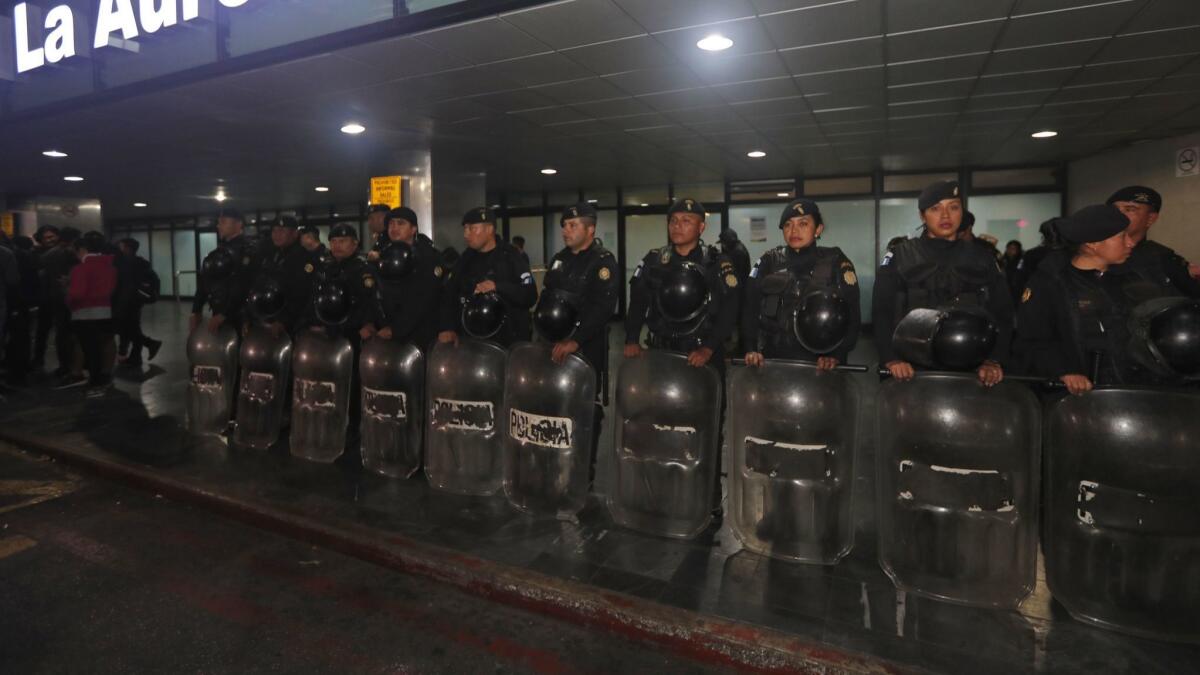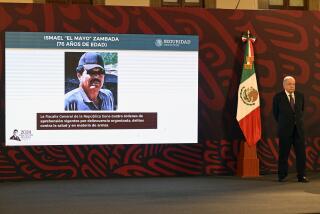Op-Ed: Guatemala’s democracy is under assault. Again

- Share via
A coup is unfolding in Guatemala. Last week, President Jimmy Morales sent riot troops to the country’s main airport in Guatemala City to block the entry of a human rights investigator working for a United Nations-backed anti-corruption panel.
The panel, called the International Commission Against Impunity in Guatemala, had been investigating Morales’ brother and son for campaign graft. They were both scheduled to face criminal proceedings this week.
After the airport standoff, Guatemala’s Constitutional Court ruled that the commission should be permitted to continue its work. Meanwhile, allies of Morales in Guatemala’s Congress attempted to impeach the judges who ruled in the commission’s favor.
Morales then ordered the U.N. anti-corruption commission to leave altogether. Its team has now fled the country. The criminal proceedings against Morales’ relatives have reportedly been suspended.
The U.S. can’t be absolved of the decades of harm it helped inflict on Guatemala, but it can choose to be on the right side of history now.
Morales, a television celebrity-turned-politician, appears to be betting that President Trump will turn a blind eye to his contempt for the rule of law. After relentless interference in Guatemalan affairs for 65 years, the United States cannot look the other way. Nor should it continue sending aid to Guatemala unless the U.N. commission is allowed to resume its work.
The Central Intelligence Agency overthrew Guatemala’s first democratic government in 1954. Following that coup, Washington backed a long series of brutal military dictatorships. Together these dictatorships killed at least 200,000 civilians, mostly indigenous people. A U.N. truth commission concluded that the carnage was nothing short of genocide.
I first moved to Guatemala in 1993, right after the “Serranazo” coup. President Jorge Serrano had attempted to suspend Guatemala’s Constitution and dissolve its Congress, allegedly in an effort to fight corruption. Within days, the Clinton administration cut off aid and threatened trade sanctions.
Serrano was ultimately ousted, and the military agreed to appoint a human rights lawyer, Ramiro de Leon Carpio, as interim president. Guatemala signed peace accords three years later, ushering in a brief period of tranquility after four decades of civil war. A U.N. peacekeeping mission helped the nascent civil society to establish nonprofits and document human rights abuses.
After a decade, in 2004, U.N. observers were preparing to leave Guatemala when local leaders asked for continued support to investigate criminal networks within the state linked to the drug trade and human rights violations. So Guatemala signed another agreement with the U.N. two years later, establishing the anti-corruption commission.
With a modest budget financed by foreign donors, the team has helped the Guatemalan attorney general’s office establish basic legal procedures, such as witness protection and wiretaps.
The commission has also helped to root out the impunity concealed by Guatemala’s leaders. In 2009, for instance, the panel uncovered a conspiracy to frame the sitting president, Alvaro Colom, for murder. Colom was later arrested on corruption charges. In its most stunning case, the commission compiled evidence that brought down Guatemala’s last president, Otto Perez Molina, for his involvement in a customs fraud scheme.
In the wake of Perez Molina’s downfall, Morales won Guatemala’s next election, campaigning with a populist slogan: “Not a criminal, not a crook.” But scandals soon proved otherwise, and Guatemalans have since held regular strikes and demonstrations to demand his resignation.
The U.S. continues to wield significant influence in Guatemala, with Washington providing tens of millions of dollars in aid to the country every year.
Enter the Fray: First takes on the news of the minute »
Morales has made obvious efforts to curry favor with Trump by making Guatemala the second country to move its embassy in Israel from Tel Aviv to Jerusalem. The Trump administration has been disturbingly silent since Morales expelled the international investigators last week.
The U.S. can’t be absolved of the decades of harm it helped inflict on Guatemala, but it can choose to be on the right side of history now. However Congress votes on Trump’s wall, Democrats and Republicans could agree to take action to prevent a new flood of political refugees from Guatemala. As Norma Torres, congresswoman from California’s 35th District, wrote last week, “putting our heads in the sand would be a serious mistake.”
Congress should immediately suspend all U.S. aid to Guatemala — most especially military aid — and condition its renewal on the return of the anti-corruption team. Lawmakers should also support legislation such as HR 7314, the Guatemala Rule of Law Accountability Act, a bill introduced by Torres that would require visa and travel sanctions against Guatemalan officials who engage in corruption and undermine the rule of law.
Guatemala is a sovereign nation, and its citizens will choose the right course if the U.S. is not silently complicit with yet another coup. With strong condemnation of Morales from Washington, more Guatemalans will take to the streets to restore honesty, democracy and justice to their government.
Liza Grandia is a cultural anthropologist and professor of Native American studies at UC Davis. She is the author of “Enclosed: Conservation, Cattle, and Commerce Among the Q’eqchi’ Maya Lowlanders.”
Follow the Opinion section on Twitter @latimesopinion or Facebook
More to Read
A cure for the common opinion
Get thought-provoking perspectives with our weekly newsletter.
You may occasionally receive promotional content from the Los Angeles Times.






